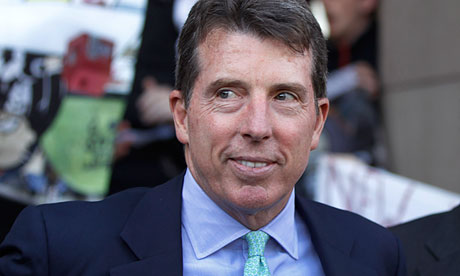![]()
-
City editor
- The Guardian, Saturday 18 August 2012
Report also criticises Bank of England and regulator for being slow to notice events leading up to Barclays' £290m fine

MPs have attacked the former Barclays boss Bob Diamond for being "highly selective" in the evidence he gave to their emergency hearings on rigging key Libor interest rates, in the first comprehensive report on the way bankers and regulators handled the scandal.
The Treasury select committee also criticised the Bank of England and the chief City regulator for being slow to notice the events that led to the£290m fine for Barclays in June. "It doesn't look good," said Andrew Tyrie, the Conservative MP who chairs the committee, pointing out that neither spotted the problems with Libor.
Speaking about Diamond's appearance before the committee last month, he said: "Select committees are entitled to expect candour and frankness from witnesses before them. Mr Diamond's evidence, at times highly selective, fell well short of the standard that parliament expects, particularly from such an experienced and senior witness."
The "poor state" of the culture at Barclays was also criticised, as was its board.
In response, Diamond made a strong defence of his 16-year tenure at the bank, arguing that Barclays had not needed a taxpayer bailout. He insisted he had answered "truthfully, candidly and based on information available to me" and that the image being created of Barclays "could not be further from the truth".
Tyrie said the episode had damaged the City. "The sustained rigging of a crucial benchmark rate has done great damage to the UK's reputation. Public trust in banks is at an all-time low. Urgent improvements, both to the way banks are run and the way they are regulated, [are] needed if public and market confidence is to be restored," he said.
The MPs took evidence from Diamond barely 48 hours after he resigned as chief executive of Barclays, and were frustrated by his refusal to acknowledge that the City regulator, the Financial Services Authority, had expressed concerns about the culture of the bank to the Barclays board in the runup to the Libor fine.
But the committee's 122-page report entitled "fixing Libor: some preliminary findings" also shows that the MPs believe the FSA and the Bank of England took the steps that led to Diamond's departure only after digesting public and media reaction to the Libor fine. "Regulators should not decide the composition of boards in response to headlines. Many will agree with the removal of Mr Diamond. However, many will wonder why the regulators did not intervene earlier, for example, at the time of the publication of the [fine]," Tyrie said.
The committee describes the Libor fine – the first of many expected to be imposed on big financial firms – as a "reputational disaster for Barclays". It forced the chairman, Marcus Agius, to quit, only to be reinstated 24 hours later after Sir Mervyn King, governor of the Bank of England, told him that regulators had lost confidence in Diamond.
Correspondence published for the first time today between Agius and Tyrie appears to support Diamond's evidence to the committee, as Agius admits that Diamond had not seen some of the documents in advance when he was asked about them last month.
The committee said the Barclays fine should be seen in the context that other banks were being investigated for rigging the rate and that investigations should be accelerated, particularly at banks owned by taxpayers – a possible reference to Royal Bank of Scotland.
Diamond's appearance before MPs was followed by those of Agius and Jerry del Missier, the top Barclays banker who quit after issuing an instruction to cut the bank's Libor submissions in October 2008, as well as those of King and his deputy, Paul Tucker.
The hearings also put candidates to replace King as Bank of England governor next year on the back foot, as Tucker and Lord Turner, chairman of the FSA, were forced to defend their actions during the period.
The MPs said one question the inquiry became focused on may have been a "smokescreen" to distract from more serious issues underlying the scandal. At one point there was confusion about whether a Bank of England official had instructed Barclays to cut its Libor submissions in an attempt to avoid any impression that the bank was in difficulty during the financial crisis. Del Missier admitted he had instructed Barclays staff to reduce submissions after a conversation with Diamond, who was relaying a conversation with Tucker at the Bank. At the time, October 2008, a higher submission to Libor would have given the impression Barclays was finding it more difficult to borrow from other banks.
Del Missier, Diamond and Tucker were cleared of "deliberate wrongdoing". "If they are all to be believed, an extraordinary, but conceivably plausible, series of miscommunications occurred," Tyrie said.
The Bank of England is accused of "naivety" in not realising there was "dishonesty" taking place in setting Libor. The FSA's shortcomings are "more serious", the MPs said, revealing the regulator was conducting an internal review into what it should have done better.
The MPs said the so-called Tucker-Diamond dialogue "may have been a smokescreen put up to distract our attention... from the most serious issues underlying this scandal". This is a reference to the two stages of the Libor rigging - the period 2005 to 2008 when Barclays treaders were manipulating rates to make potential profits and the period 2007 to 1009 when Barclays was lowing its submissions through "low balling" to avoid negative publicity

